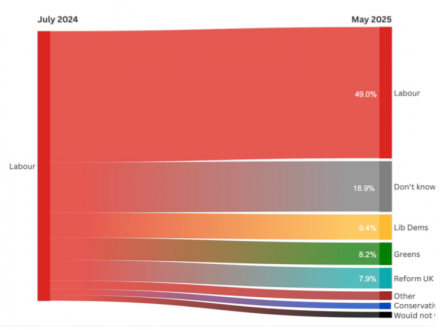The statistics on the pressures facing households across Britain are clear. Inflation in October almost hit 4%, double… The post ‘Refreshing Help to Save is a low-cost way to help millions build financial resilience’ appeared first on LabourList.
The statistics on the pressures facing households across Britain are clear. Inflation in October almost hit 4%, double the Bank of England’s target. Interest rate levels mean that borrowing and housing costs are rising. Across Britain, household savings are being eroded as people scramble to cover the cost of living – rent, mortgages, council tax and utility bills are all significantly higher than they were just a few years ago.
Every day our advisors speak to people who are struggling just to make ends meet and manage cost-of-living pressures. Our latest polling estimates that two in five people in the UK – equivalent to almost 22 million – would not be able to meet an unexpected expense of £1,000 without turning to borrowing.
What’s more, our YouGov cost-of-living tracker polling found that for Labour voters, two in five (39%) said that they have found it difficult to keep up with household bills and credit in the last few months, with over one in ten (11%) saying they have turned to a credit card to pay for essentials. All this evidence shows us that any talk of an end to the cost-of-living crisis is completely misguided.
READ MORE: Lucy Rigby: ‘Making financial services work for everyone’
With the second Budget of this Parliamentary session soon upon us, the Chancellor and her team have the chance to start the process of alleviating these pressures and building financial resilience – placing household financial health at the heart of the Treasury’s priorities by delivering high impact, low cost reforms.
Our thirty years of experience providing debt advice tell us that if people had just a small savings buffer, they could weather unexpected financial storms and avoid turning to borrowing and the problematic coping mechanisms that can come with it. As such, a commitment to expanding savings schemes to incentivise people who are ‘just about managing,’ and also those in full-time work to build up a buffer would be a step forward that aligns with Labour’s commitments to expand financial inclusion.
The Help to Save scheme was initially launched in 2018 and was aimed at those on lower incomes to improve financial stability. It provides a 50% bonus on savings of up to £50 a month, with savings paid in year two and four, entirely tax free. But, as it stands, just one in ten people eligible are opting to take up the scheme, with around 3 million people missing out on the support and the chance to build a meaningful savings buffer.
Subscribe here to our daily newsletter roundup of Labour news, analysis and comment– and follow us on Bluesky, WhatsApp, X and Facebook.
Last year, the Government announced it would extend the scheme to 2027; extend access to more working people receiving UC; and consult on further reforms from 2027 – decisions we welcomed.
We’d like to see the Chancellor commit to refreshing the scheme with a focus to meet the policy priorities of today and not the 2010s, providing a focus on addressing child poverty through auto-enrolment and extending access to parents with young children – whether they are in work or not. One in four of our debt advice clients are struggling single parents and while many are working, those who are not also desperately need help to build financial resilience.
Alongside reforms to Help to Save, the Government should continue to take action alongside regulators to encourage employers to roll out workplace ‘sidecar’ savings schemes. These schemes work by diverting a proportion of pensions saving to a ‘sidecar’ pot that can be accessed at short notice for unexpected expenses. Research by Nest Insight shows when run on an opt-out basis they are highly effective in supporting employees to take prudent decisions to save.
Our research found that as it stands one in four people (23%) do not save towards a rainy day fund. I’m not pretending that these two steps will fix all the issues facing households – there are many issues the Government needs to consider.
Share your thoughts. Contribute on this story or tell your own by writing to our Editor. The best letters every week will be published on the site. Find out how to get your letter published.
But we need to move towards looking at the financial health of households, and central to this is building financial resilience. Firm action on increasing personal savings, particularly as households continue to face significant cost of living pressures, would be a welcome first step.
-
- SHARE: If you have anything to share that we should be looking into or publishing about this story – or any other topic involving Labour– contact us (strictly anonymously if you wish) at [email protected].
- SUBSCRIBE: Sign up to LabourList’s morning email here for the best briefing on everything Labour, every weekday morning.
- DONATE: If you value our work, please chip in a few pounds a week and become one of our supporters, helping sustain and expand our coverage.
- PARTNER: If you or your organisation might be interested in partnering with us on sponsored events or projects, email [email protected].
- ADVERTISE: If your organisation would like to advertise or run sponsored pieces on LabourList‘s daily newsletter or website, contact our exclusive ad partners Total Politics at [email protected].
The post ‘Refreshing Help to Save is a low-cost way to help millions build financial resilience’ appeared first on LabourList.







